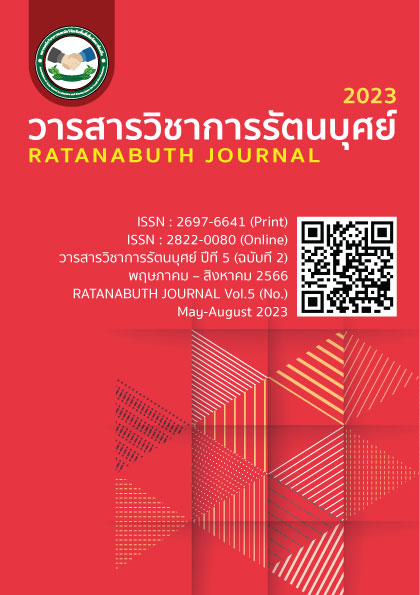School Administration According to Brahmavihara 4 of School Administrators under Loei Provincial Office of the Non-Formal and Informal Education School Administration According to Brahmavihara 4 of School Administrators under Loei Provincial Office of the Non-Formal and Informal Education
Main Article Content
Abstract
The objectives of the research were: 1) to study the school administration according to Brahmavihara 4 of school administrators under Loei Provincial Office of the Non-Formal and Informal Education 2) to compare the school administration according to Brahmavihara 4 of school administrators under Loei Provincial Office of the Non-Formal and Informal Education classified by, gender, age and work experience, and 3) to study the ways to develop the school administration according to Brahmavihara 4 of school administrators under Loei Provincial Office of the Non-Formal and Informal Education The sample was 162 teachers The instrument used for data collection was the five-level rating scale questionnaire, reliability value of .944 and structured interview. The statistics used to analyze the data were: Frequency, Percentage, Mean, Standard Deviation, t-test (Independent Samples), F-test (One-Way ANOVA) and interview by content analysis.
The research results were as follows:
1) The statistic scores of the school administration according to Brahmavihara 4 of school administrators under Loei Provincial Office of the Non-Formal and Informal Education in overall was at a high level, arranging in descending order; equanimity, loving-kindness, sympathetic joy and compassion.
2) The comparative scores of the school administration according to Brahmavihara 4 of school. administrators under Loei Provincial Office of the Non-Formal and Informal Education classified by gender, age and work experience were found not to be different.
3) The ways to develop the school administration according to Brahmavihara 4 of school under Loei Provincial Office of the Non-Formal and Informal Education found that 1) Loving- kindness; the administrators should give love and good desire to subordinates, should give them recommendations about working, assign tasks appropriately, maintain unity and work happily with success. 2) Compassion; the administrators should give subordinates advice and problems solution with self-domination, dominance and working. Supporting self-development and various welfare. 3) Sympathetic joy; the administrators appreciate to subordinates when they are successful and prosperous with sincerely, 4) Equanimity; the administrators are fair and reasonable, do not judging as prejudice and give equal importance to everyone 's duties.
Article Details

This work is licensed under a Creative Commons Attribution-NonCommercial-NoDerivatives 4.0 International License.
References
ณัฐวรรณ ฐิตาคม (2556). การประยุกต์ใช้หลักพรหมวิหาร 4 ในการบริหารงานของผู้บริหารสถานศึกษา สำนักงานเขตพื้นที่การศึกษามัธยมศึกษาเขต 42. วิทยานิพนธ์ พุทธศาสตรมหาบัณฑิต. บัณฑิตวิทยาลัย : มหาวิทยาลัยมหาจุฬาลงกรณราชวิทยาลัย.
บุญชม ศรีสะอาด. (2556). การวิจัยเบื้องต้น. พิมพ์ครั้งที่ 9. กรุงเทพฯ : สุวีริยาสาส์น.
พระครูวิวัฒน์ธรรมานุกูล (อ๊อด ธมฺมปาโล). (2559). ความคิดเห็นของครูที่มีต่อผู้บริหารสถานศึกษา ตามหลักพรหมวิหาร 4 ของโรงเรียนประถมศึกษา เขตสายไหม สังกัดกรุงเทพมหานคร. วิทยานิพนธ์พุทธศาสตรมหาบัณฑิต. บัณฑิตวิทยาลัย : มหาวิทยาลัยมหาจุฬาลงกรณราชวิทยาลัย.
พระธวัชชัย ถาวโร (กันยา). (2560). การบริหารตามหลักพรหมวิหาร 4 ในสถานศึกษาขั้นพื้นฐาน สังกัดสำนักงานเขตพื้นที่การศึกษาประถมศึกษาร้อยเอ็ด เขต 2. วิทยานิพนธ์พุทธศาสตรมหาบัณฑิต. บัณฑิตวิทยาลัย : มหาวิทยาลัยมหาจุฬาลงกรณราชวิทยาลัย.
พระปลัดจันทร์ สิริจนฺโท (พงษ์แตง). (2561). แนวทางการพัฒนาการบริหารบุคคลตามหลักพรหมวิหาร 4 ของผู้บริหารโรงเรียนประถมศึกษา เขตบางแค สังกัดกรุงเทพมหานคร. วิทยานิพนธ์ สาขาวิชาพุทธบริหารการศึกษา. บัณฑิตวิทยาลัย : มหาวิทยาลัยมหาจุฬาลงกรณราชวิทยาลัย.
พระปลัดมงคล วราสโย. (เรืองอาคม). (2561). แนวทางการพัฒนาคุณลักษณะผู้บริหารตามหลักพรหมวิหาร 4 โรงเรียนประถมศึกษา อำเภอพระประแดง จังหวัดสมุทรปราการ.วิทยานิพนธ์ครุศาสตรบัณฑิต. สาขาพุทธบริหารการศึกษา.
บัณฑิตวิทยาลัย : มหาวิทยาลัยมหาจุฬาลงกรณราชวิทยาลัย.
พระภาณุพงศ์ มหชฺฌาสโย. (วรรณอําไพ) (2562). การบริหารงานตามหลักพรหมวิหาร 4 ของผู้บริหารโรงเรียนศูนย์เครือข่าย พัฒนาคุณภาพการศึกษาหนองกุงศรี 2 สังกัดสำนักงานเขตพื้นที่การศึกษาประถมศึกษากาฬสินธุ์ เขต 2. วิทยานิพนธ์สาขาวิชาการบริหารการศึกษา. บัณฑิตวิทยาลัย : มหาวิทยาลัยมหามกุฏราชวิทยาลัย.
พระมนัส อคฺคธมฺโม (ก้อนใหญ่). (2554). ภาวะผู้นำของผู้บริหารตามหลักพรหมวิหาร 4 โรงเรียนมัธยมศึกษาเขตตลิ่งชันกรุงเทพมหานคร. วิทยานิพนธ์ปริญญามหาบัณฑิต. มหาวิทยาลัยมหาจุฬาลงกรณราชวิทยาลัย.
พรนภา ชำนินอก. (2558). การใช้หลักพรหมวิหาร 4 ในการบริหารโรงเรียนศูนย์เครือข่ายพัฒนาคุณภาพการบริหารการศึกษายางตลาด 3 จังหวัดกาฬสินธุ์. สารนิพนธ์. บัณฑิตวิทยาลัย : มหาวิทยาลัยมหามกุฏราชวิทยาลัย.
อุทิศ การเพียร. (2558). การบริหารบุคลากรตามหลักพรหมวิหาร 4 ในทัศนะของบุคลากรตำแหน่งปฏิบัติการวิชาชีพและบริหารทั่วไป. วิทยานิพนธ์พุทธศาสตรมหาบัณฑิต. มหาวิทยาลัยมหาจุฬาลงกรณราชวิทยาลัย.


